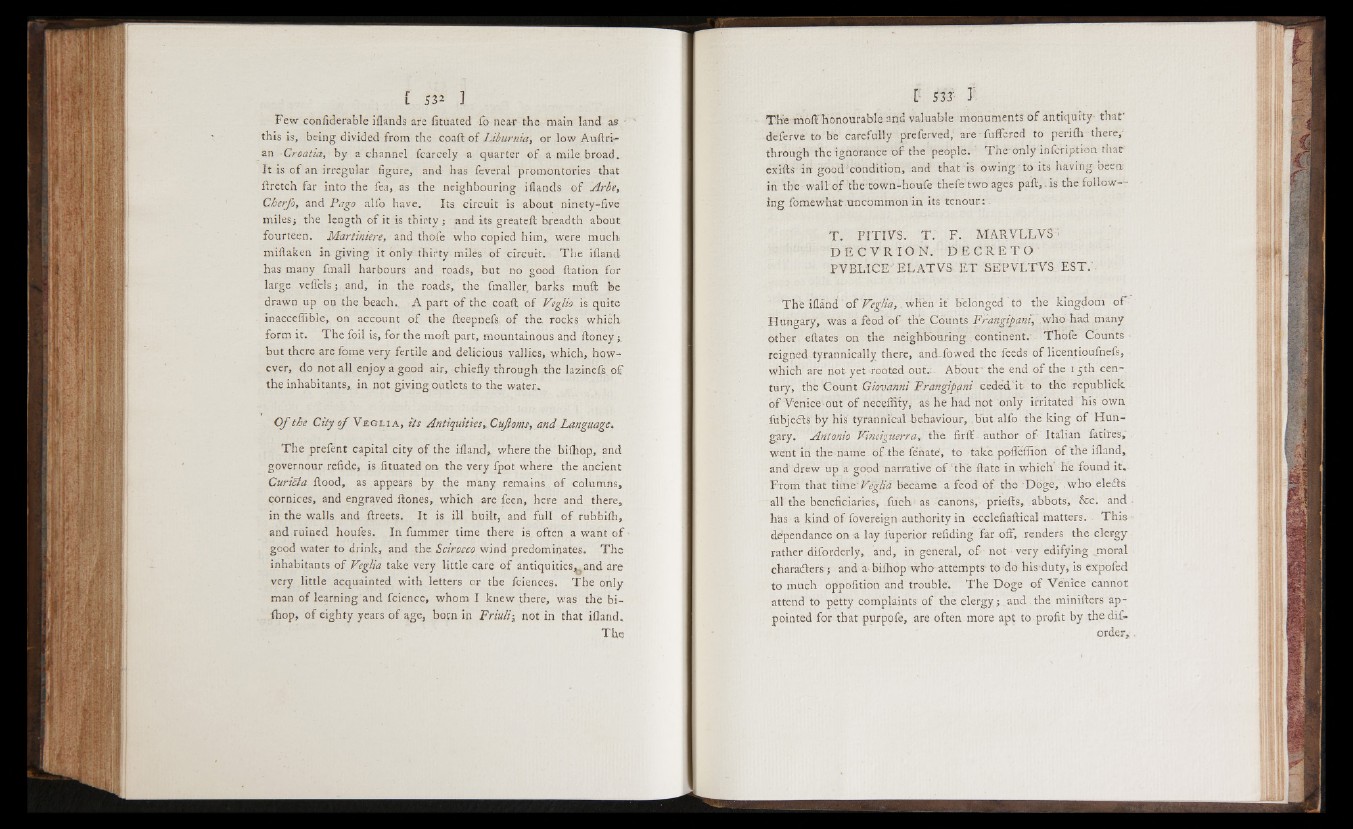
Few confiderable iflands are fituated io near the main land as
this is, being divided from the coail of Liburnia, or low Auftri-
an Croatia, by a channel fcarcely a quarter o f a mile broad.
It is of an irregular figure, and has feveral promontories that
llretch far into the fea, as the neighbouring iflands o f Arbe,
Cherfo, and Pago alfo have. Its circuit is about ninety-five
miles j the length of it is thirty ; and its greateil breadth about
fourteen. Martiniere, and thofie who copied him,, were much
miflaken in giving it only thirty miles of circuit. The iiland
has many fmall harbours and roads, but no good ftation for
large veffels; and, in the roads, the fmaller, barks muft be
drawn up on the beach., A part of the coail of Veglio is quite
inacceffible, on account o f the fteepnefs. o f the rocks which
form it. The foil is, for the moil part, mountainous and iloney ;
but there are fome very fertile and delicious vallies, which, however,
do not all enjoy a good air, chiefly through the lazinefs o f
the inhabitants, in not giving outlets to the water.
O f the City o f Ve g l i a , its Antiquities, Cujloms, and Language.
The prefent capital city o f the iiland, where the biihop, and
governour refide, is fituated on the very fpot where the ancient
CuriBa flood, as appears by the many remains o f columns,
cornices, and engraved Hones, which are feen, here and there,
in the walls and ftreets. It is ill built, and full o f rubbiib,
and ruined houfes. In fummer time there is often a want o f
good water to drink, and the Sciroceo wind predominates. The
inhabitants o f Veglia take very little care o f antiquities^and are
very little acquainted with letters or the fciences. The only
man of learning and fcience, whom I knew there, was the biihop,
of eighty years of age, born in Friulij not in that ifland.
The
The moil Honourable and valuable monuments o f antiquity’ that'
deferve to be carefully prefcrved, are fuffered to periih there,’
through the ignorance o f the people. The only infcription that
exiils iti good'condition, .and that is owing ; to its having beet*
in the wall of the town-houfe thefe two ages pail, j is the follow--
xng fomewhat uncommon in its tenour:
T . PrTIVS. T . F. M A R V L LV S Ï
D E C V R I O N . D E C R E T O
PVB LICE 'E L A T V S E T SEPVLTVS. E S T . .
Thé iiland o f Veglia,: when it belonged to the kingdom o f
Hungary, was a fèod o f the Counts Frangipani, who had many
other eftates on the neighbouring. continent.;- Thofe Counts-
reigned tyrannically there, and fowed the feeds o f licentioufnefs,
which are not yet rooted out. About ' the end o f the 15th century,
the Count Giovanni Frangipani ceded'it to the republick
o f Venice out of neceffity, as he had not only irritated his own
fubjeciS by his tyrannical behaviour, but alfo - the king o f Hungary.
Aritonio Vinciguerra, the firil author o f Italian fatires,
went in the name of the fenate', to take ppiTeffion o f the iiland,
and drew up a good narrative o f ‘thè ftate in which he found it. -T. - O •
From that tim f Véglia became a feod o f the ; Doge, who eleits
all the beneficiaries, fuch as canons,- prieits,-abbots, 8cc. and
has a kind o f fovereign authority in ecclefiailical matters. ■ This -
dépendance on a lay fuperior refiding far off, renders the clergy
rather diforderly, and, in general, o f not very edifying .moral
characters ; and a-biiliop who attempts’ to-do his duty, is expofed
to much oppofition and trouble. The Doge o f Vénìce cannot
attend to petty complaints o f the clergy ; and the minifters appointed
for that purpofe, are often more apt to profit by thediforder,,